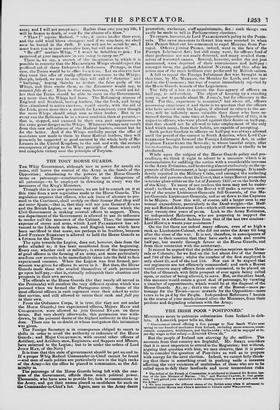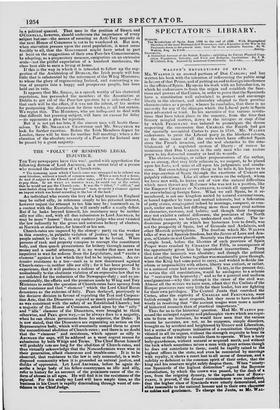THE IRISH POOR " POSTPONED."
MINISTERS mean to patronize colonization from Ireland in drib- lets. A Limerick paper tells us, that " Government intend offering a free passage to New Setuth Wales next spring to one hundred mechanics from Ireland, including stone- masons, stone- cutters, carpenters, bricklayers, and hlarkeinithe : who will be engaged at Sc. per day wages in that colony.—Limerich Chron'cle."
But the people of Ireland are starving by the million. The accounts from that country are frightful. Mr. SHEIL considers that it is most important to attend to the Registries; but without, arguing that question with him, we may observe, that it is possi- ble to consider the question of Poor-laws as well as to prepare with energy for the next election. Indeed, we cannot help think- ing that there is something cruel in pushing aside a measure affecting the very existence of multitudes of those who are to be called upon to defy their landlords and incur tremendous risks • The defeat of the French at Constantine is attributed to General Da R myy. bro- ther of the late Minister of Marine. " Sir." said Marshal CLAWIEL, Sc that gentle- man. "you gained your epaulettes in the drawing-nann—that is your place, and not
the Army." .1. We may instance the different states of the British army when It advanced to Valladolid under Moose and when it marched to Vittoria under WeLLINOTOrl.
in a political quarrel. That men in the position of Salim and °Coes:ELL, however, should underrate the importance of every subject but one—the means of securing an Anti-Tory majority in the next House of Commons is not to be wondered at. But now, when starvation presaes upon the rural population, it must occur forcibly to all, that the Government might have acted in part at least on the suggestions of their own Poor-law Commissioners, by adopting, as a preparatory measure, emigration on an extensive scale—not the pitiful exportation of a hundred mechanics, the class best able to earn a living at home.
If this is the way in which it is intended to follow up the sug- gestion of the Archbishop of DUBLIN, the Irish people will lose little that is substantial by the retirement of the Whig Ministers; to whom the glory of regenerating Ireland, and converting a na- tion of paupers into a happy and prosperous people, has been held out in vain.
It appears that Mr. SHRILL, in a speech worthy of his rhetorical reputation, has persuaded the members of the Association at Dublin to get rid of the Poor-law question by a side-wind,—for that such will be the effect, if it was not the intent, of his motion for postponing the discussion for three weeks, is all but certain. We regret this. The Ministers, who are indisposed to deal with that difficult but pressing subject, will have an excuse for delay —its opponents a plea for rejection.
But it is not yet too late, if the sincere men will bestir them- selves. To Mr. SHARkIAN CRAWFORD and Mr. STAUNTON we look for further exertion. Before the Irish Members depart for London, there will be time for another full meeting; when a de- claration of the absolute necessity of a Poor-law for Ireland may be passed by a great majority.























 Previous page
Previous page